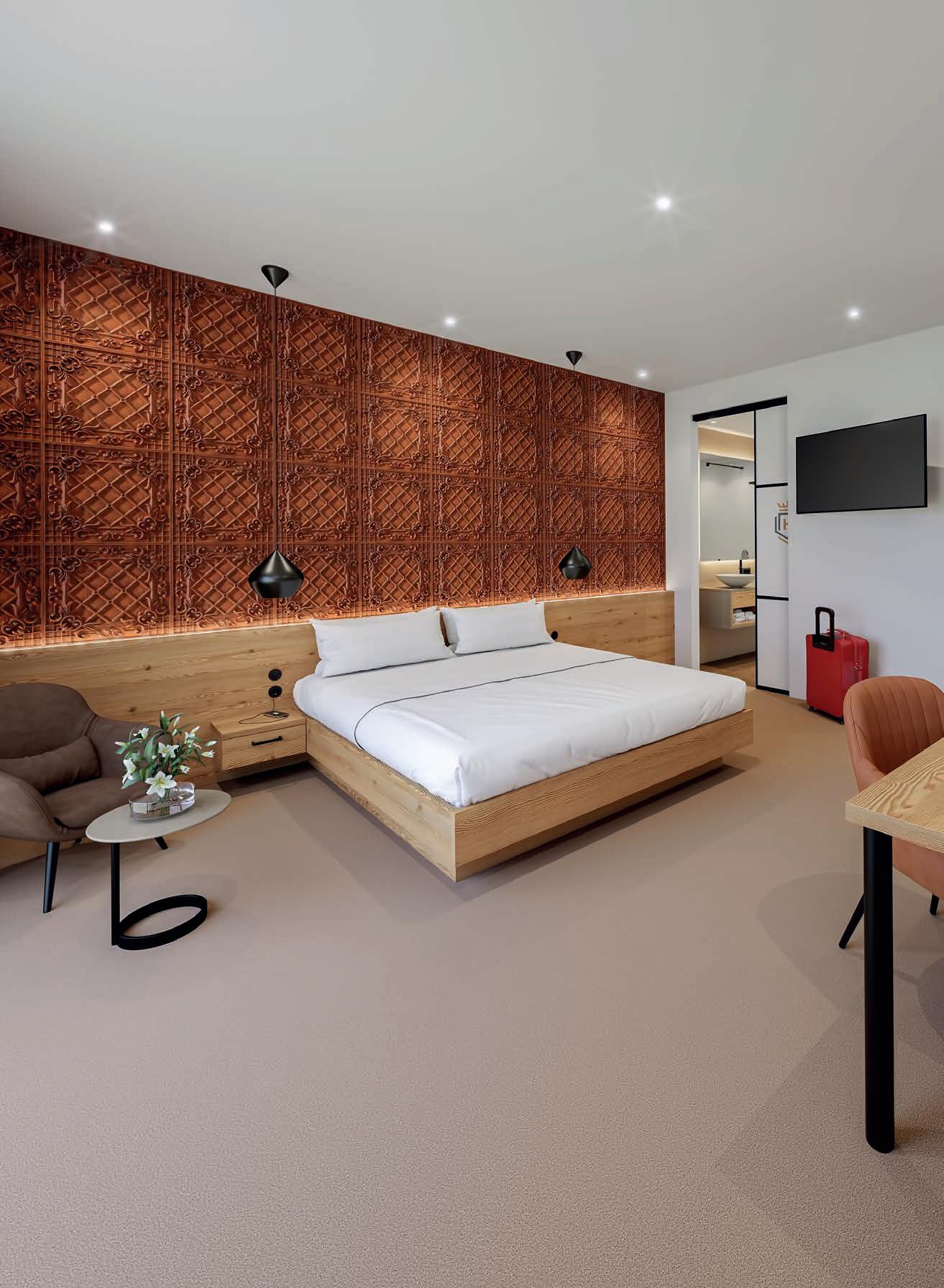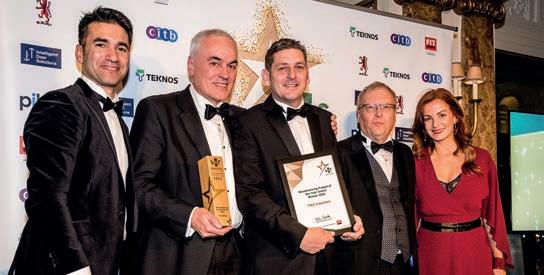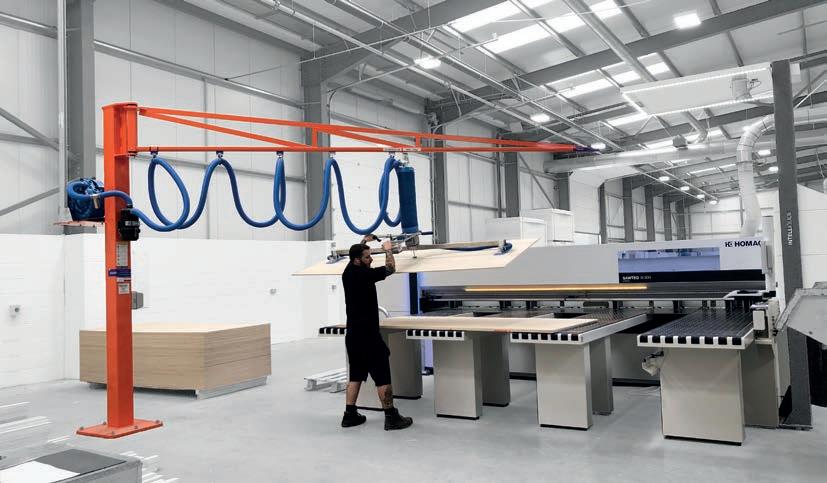
16 minute read
News
Former MD of the British Furniture Manufacturers (BFM), Nick Garratt, has taken the role of chairman at the trade body
Outgoing MD of the British Furniture Manufacturers (BFM), Nick Garratt, is gearing up to take the role of chairman at the trade body, as he welcomes his successor Sean Holt to the leadership role.
During his three years at the helm of the BFM, Nick has overseen a number of changes, with a view to moving the association forward. This has included the introduction of new services for members, as well as activities to help increase the profi le of BFM within the wider industry.
Key initiatives include the Markel Law online hub, a signifi cant new benefi t for BFM members which offers legal and business advice on key subjects such as health and safety, employment, tax, contracts and data protection.
New branding has also been introduced, putting a clear identity forward for the association. When the Covid-19 pandemic hit in early 2020, the BFM was quick to provide up-todate guidance and information for members.
More recently, the BFM’s new website launched last year, while a series of BFM webinars is providing members with top-fl ight expertise from a variety of experts.
“My time as MD at the BFM has been exciting, challenging and thoroughly enjoyable,” says Nick. “I’m delighted the association is in a strong position as I hand over to Sean Holt. BFM aims to grow, to expand membership and increase its value and relevance to industry – and Sean is the ideal person to steer the organisation through the next stage of development.”
As Sean takes the reins, Nick’s wealth of industry expertise will remain with BFM as he moves to a part-time role as chairman of the board. Current chair, Brian Ahern, will become vice-chairman, and John Woolley will stand down from this position, but continue to serve as a member of the board.
Nick adds: “While it is time for a new direction, I’m delighted to remain involved at BFM in the role of chairman and look forward to working with the board and Sean as he brings new ideas to drive the association forward.
“Sean’s leadership and experience at the head of a number of membership organisations is a great asset and, combined with the industryspecifi c expertise of the board, we have created a fantastic team to ensure we can fulfi l BFM’s ambitious agenda.” www.bfm.org.uk
Kommerzialrat Johann Felder (19302021), founder and long-time MD of the Felder Group, peacefully passed away surrounded by his family on 7th December after a brief but severe illness.
With his passing, his family, as well as the company’s employees, are losing an inspiring and striking personality, who turned the Felder Group into the successful family business it is today.
In 1956, in his hometown of Absam (Tyrol), Johann Felder and his wife Gertraud founded the company, Johann Felder jun. in the workshop at his parents’ house. That same year, they presented the fi rst Felder woodworking machines at trade fairs in Vienna and Innsbruck.
Over the following decades, the company kept growing, moved from Absam to Hall in Tirol and fi nally made a name for itself far beyond the borders of Tyrol as a trailblazing mechanical engineering company of global importance.
Today, the Felder Group is among the leading mechanical engineering and technology companies in the fi eld of wood and composite processing worldwide, and continues to surprise with technical innovations.
Johann Felder was known for his positive outlook on life and his progressive worldview.
He was greatly respected in Austria and abroad. His wife Gertraud, his sons Hansjörg and Martin Felder – the company’s current MDs – his daughter Elisabeth, his grandchildren Daniel, Patrick, Tamara, and Alexander Felder, the third generation working in the family business, as well as the entire Felder Group staff, are deeply saddened by Johann Felder’s passing. They are losing not just an altogether fascinating and strong personality, but also a mentor and a dear friend. www.felder-group.com

Robbie O’Neill is the new MD of Ferwood UK, taking over the role from John Wilson who has become the CEO of Ferwood UK and USA following the expansion of the Ferwood Group. Robbie brings with him over 30 years of experience in the furniture and woodworking industry, a wealth of product knowledge and vast industry contacts, making him the ideal candidate to maintain and strengthen the UK business.
“Ferwood’s approach to business has always impressed me,” begins Robbie. “For Ferwood, it’s not just about buying and selling machinery. Ferwood’s business ethos centres around building relationships and fi nding solutions for its customers. The company’s attitude to help both its suppliers and customers resonated with me and made the business and role a good fi t for me.”
Going forward, Robbie is keen to underpin the work John and the team have done in the UK. “He’s built a successful business model and a winning formula,” says Robbie. “Because of this, I’m able to focus my immediate attention on supporting the team and our existing customers. Plans are already in place to accommodate the changing market and, following a recordbreaking 12 months of sales for Ferwood UK, we have a clear vision of what we want to achieve and how we intend to do it.”
Robbie adds: “Today’s industry has a massive appetite for machinery and we have a business framework in place that allows us to satisfy this demand quickly, whilst maintaining a high level of customer service. This is a huge selling point for us, and with my experience dealing with industrialised machinery and providing solutions to UK companies across the board, I’m excited to be working with an established, credible supplier of reconditioned machines in the UK and Ireland. I’m hungry for this new challenge and I’m excited to be steering a new ship.”
Riccardo Rossi, CEO of Ferwood, concludes: “The UK is one of the biggest markets for us and, since the company was founded six years ago, Ferwood services and supplies reconditioned machinery to seven out of the 10 biggest panel manufacturers in the UK. John has done an exceptional job building the business to this level and to form a strong, knowledgeable team that refl ects the company’s core business values and, whilst he will continue to be available to UK customers and remain on the board of directors, I know he will continue to do the same great work in America. Robbie has achieved a lot in his career – working closely with some of the biggest producers in the business – and I believe he possesses the attributes needed to grow the business and its presence in the UK market. I look forward to working with him.” www.ferwoodgroup.com

Giuseppe Giliberti is the newest addition to TM Machinery’s engineering team. An avid sportsman brimming with team spirit, Giuseppe’s drive and eagerness to learn, combined with his naturally competitive nature, has seen him complete a level three course in electrical and electronic engineering and win one of only 30 places on Toyota’s hugely popular four-year apprenticeship programme to become a fully-qualifi ed, multi-skilled maintenance engineer.
“It was the best thing I ever did, and to beat thousands of people to gain an apprenticeship that was in partnership with Toyota was an immensely proud moment for me,” says Giuseppe. “The fi rst two years were spent at Toyota’s apprentice development centre – a school for engineering – where we learned everything from electrical hand skills, welding, hydraulics and pneumatics to practical machining on lathes and mills. It was an intense period of time but I learned so much and it really fuelled my interest in engineering.”
It came as no surprise to Giuseppe’s family that, following the completion of his apprenticeship, he became a machinery maintenance engineer and spent two years expanding his machinery knowledge.
“I spent my time learning as much as I could about woodworking machinery by stripping them down and rebuilding them,” he says. “It was a great way to build on my competencies and it gave me an opportunity to work on panel and solid wood machinery.”
But Giuseppe was keen to embark on a new challenge and gain more on-site experience. In June 2021, he became TM Machinery’s newest service engineer.
“From the off, TM approached things differently,” admits Giuseppe. “They wanted to know what I’d learned since completing my apprenticeship programme, what I enjoyed, what I wanted out of my career and where I wanted to go. They wanted to make sure it was the right fi t for both of us and, as a result, I’m in a job I really enjoy and that continues to challenge me every day. I now cover everything from machinery repairs and maintenance to machinery dismantling and installations.”
It is the machinery installations that Giuseppe particularly enjoys. “Building something from nothing excites me,” he says. “I felt the same way at school, and always enjoyed fi nding out how things were made. Recently, I worked with another engineer to decommission a wall saw and move it to another unit, where we then had to reinstall and fully test the machine ready for use. This kind of job puts everything I’ve learned into practise and puts my skills to good use. There’s no better feeling for me and I’m excited to be part of the TM team.” www.tmmachinery.co.uk

By Gary Peters, director at The Metals Warehouse
It goes without saying that the last 18 months have been one of, if not the most challenging periods for many businesses across the UK and the entire world – and for The Metals Warehouse it has been no different.
When Covid-19 hit, we saw a lot of our customer base shutting their doors. That forced us to re-engineer our business. It forced us to actually look at what made us money. It forced us to look at areas of the business that needed change. So, we made changes accordingly. “Over the last 12 months, it has become clear that we don’t need to grow the business in terms of turnover. If we can, brilliant, but we’re focusing more on the areas that make us money”

Covid, furlough and redundancy
Firstly, like many businesses across the UK, we needed to utilise the furlough scheme, and what we were seeing was that areas of the business were still comfortable, despite having several members of our team on furlough for three months. That’s a horrible realisation, and one we had to look into. Ultimately, it became clear we had to look into redundancy, and it was one of the hardest business decisions we’ve ever had to make.
As a group of owners, we’re driven by our staff. It’s those guys that motivate us. That, to me, is what made owning The Metals Warehouse so special. To make those people redundant, as we did that year, was awful. They were being let go through no fault of their own.
We didn’t buy this business, we had grown up through it and grown with these people. That itself is, perhaps, one reason why we hadn’t previously put the business first.
Covid-19 forced us, and the manufacturing industry as a whole, to have a rethink, and since then, everything that we have done has been good for the business. How that plays out longer term and what impact this pandemic has over a bigger scale of time, remains to be seen.
We could be looking back at this in 10 years’ time and say it was an absolute disaster for us as a business, but right now that’s not the case, and the next thing for the industry is what impact this past year has had on businesses and whether Covid-19 and the furlough scheme has kicked the can down the road.
We’re going to see a number of businesses – not just in the manufacturing sector – that are going to have some tough decisions to make over the next few months.
Viable business decisions
Over the last 12 months, it has become clear that we don’t need to grow the business in terms of turnover. If we can, brilliant, but we’re focusing more on the areas that make us money.
For example, delivering a sheet of stainless steel to Derby costs far less than delivering that same product up to Manchester.
Prior to Covid-19, that’s where we had been pushing the business over the last few years – it was all about breaking into new areas across the UK and growing our presence outside of the Midlands.
Our decisions were always based on sales, rather than on whether it was a viable business decision. We put a lot of infrastructure in place in order to be able to do that. Because of Covid-19, though, we’ve seen that, actually, we don’t need to do that. We don’t need to be putting tonnes of metals onto lorries every single day.
We’ve got a viable business that is turning over far less, but one that is more local-focused.
In other words, prior to the pandemic, we were scared to say ‘no’ to customers. Turnover was the priority over profit, and we thought if we didn’t take on a job, that customer wouldn’t ever come back to us. It’s a ridiculous way to think, but it’s how we have been for so long.
Over the last 12 months, though, we have said ‘no’, and there are a few reasons for that. Prices have now more than doubled since January 2020, and we’re not in a position to be able to sell it as cheaply as we had previously.
Due to the issues at the ports, we haven’t had the depth of stock that we used to have in place, and therefore we have had to be selective in who we sell to. The last 12 months have shown us that we don’t have to undercut the market for our existence.
A finished product
Consumers are happy to pay far more than the margins we make selling to big engineering and fabrication companies, but they want a solution to a problem. At the moment, we only offer a part of that solution.
If customers want a piece of stainless steel to act as a splashback behind a cooker, that’s something we can fulfil. What we don’t offer is the drill holes that will enable the customer to attach it to the wall or the glue or the cleaning agent to keep it looking in pristine condition.
For the customer that only knows that they’re looking for a splashback, that’s exactly what they’re going to search for online. At that point, no-one is going to be seeing our very specific stainless steel sheets that do the job equally as well as anything on the market.
So, we’re looking at the products we are selling and we’re identifying what they’re being used for. From there, we’re tailoring them to ensure that customers are finding the specific products they need.
This is where the end product comes into it. We’re looking at the packaging, developing how-to instructions, and making something that fulfils exactly what the customer wants.
Improving online
The next generation, Gen-Z if you will, are heading to the internet
>>

fi rst to make their purchases, and that’s something we have to meet.
We still have a fax machine and we still have customers that are sending their enquiries through to us via fax. I suspect that we will see that machine on the Antiques Roadshow at some point.
Like many manufacturing businesses, though, that, of course, is starting to change. We are shifting our focus to make sure that when potential customers are searching for a product, we are top of the search engines and they can then make a swift, informed decision to purchase.
Our website is now a priority. It’s user friendly, but only to a point. Right now, we have got a couple of different paths to the same product. A customer might want to purchase a full sheet for something, or they might want a cut sheet. They’re the same product, though, and that can cause frustration.
Our online journey is over-complicated, and fi xing that is a priority. The benchmark for online service is Amazon. When customers shop on Amazon, they don’t compare prices anywhere else because of how easy it is. You click on the
>> product, swipe your fi nger across the screen, you’ve completed the purchase and it’ll be here the next day. That’s the measure of ecommerce. We’re not naive to think we’ll get up to that standard, but it won’t stop us from striving towards implementing some of those changes.
Looking forward
In summary, once we have implemented these changes, I think as a business we’ll be in a really good position. The UK market is in a really good position at this point in time, too. For manufacturing, in particular, this is a great moment. Previously, there were a lot of tariffs that the sector had to pay when the UK was part of the EU, but since Brexit, that’s not the case any more, and that has given us a competitive advantage. You can fi nd out more about this and the overall impact of Brexit within the manufacturing industry in the report – Manufacturing & Brexit: The UK in a Changing Europe. It presents an opportunity, and it has the potential to be a very exciting couple of years for the manufacturing industry. www.metalswarehouse.co.uk
Due to the current coronavirus situation and the resulting concern in the sector, February’s dateline for ZOW – a key supplier fair for the furniture and interior design industry – has been postponed until 3rd-5th May 2022.
Rising coronavirus numbers in Germany and across Europe are presenting new challenges for the industry. According to Matthias Pollmann, vice president of trade fair management at Koelnmesse: “There is increasing uncertainty among companies about whether taking part in a trade fair would currently be the right and responsible thing to do.
“We are communicating closely and in a spirit of trust with our exhibitors, industry representatives and visitors. What has become clear from our many conversations is that most are not prepared to attend ZOW in February 2022 as visitors or exhibitors, and that they have serious doubts over whether ZOW can successfully go ahead in a few weeks with the situation as it is.” www.zow.de
Back in March 2021, Furnica announced the launch of a new sliding door system made from aluminium for the UK market. In November, the fi rst deliveries were made to new dealers in Northern Ireland and central England.
Furnica is now seeking dealers throughout England, Wales, Ireland and Scotland to distribute and manufacture the fi nished doors ordered by customers on the furnica.co.uk platform.
A special application for designing sliding doors by customers will be launched at the beginning of this year. Dealers will carry out these orders using the Furnica systems. Furnica will provide a full technical support package, the necessary tools to manufacture fi nished doors and training in production.
A permanent stock will be maintained at the company’s warehouse in Rugby, allowing fast delivery of profi les and accessories to any



location in the UK.
“Our focus is to introduce the new aluminium sliding door system to the UK market in a complete way,” explains Jacek Siewiaryn, who is responsible for product launch in the UK, “which will ensure product availability, fast delivery, and full technical support for each dealer that joins our network.
“We are looking for companies who already make made-to-measure furniture and kitchens for their customers. We are sure that our sliding door system will perfectly complement the offer of our partners.” 07441 909300 www.furnica.co.uk







